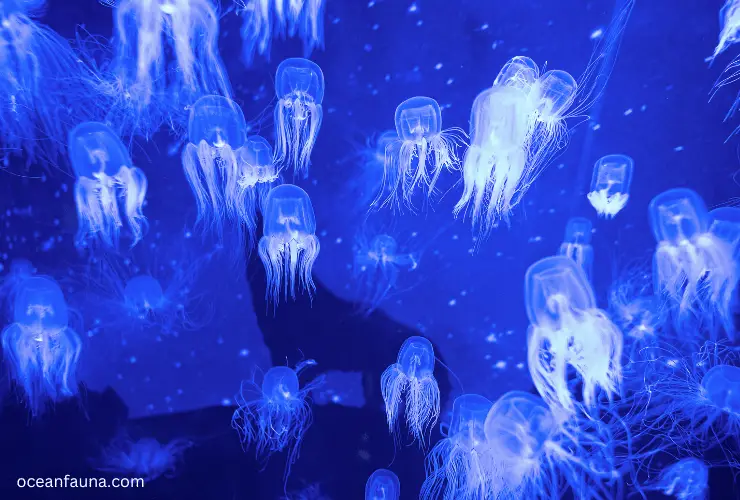Yes, jellyfish do die. There are rumors on Google that say there is an exception known as the immortal jellyfish, which has an endless life span. Are you thinking, how is it possible if all living beings die after a certain time? Is it really true? We know you were stunned after reading it. But don’t worry; we are here to find out the facts.
Jellyfish are living organisms. They have a lifespan, just like all living things. The lifespan of a jellyfish can vary depending on the species and environmental factors. Most jellyfish live for only a few months to a few years. Jellyfish continue to fascinate us with their unique biology and behaviors, even though their time on earth is limited.
Jellyfish, like sea anemones and corals, are part of the Cnidaria group. They’re living beings, so they’re subject to the cycle of life and death, just like us. Mythser, some myths are around the corner that there is one jellyfish species that seems to bend the rules. Despite that, jellyfish still hold a special place in our hearts with their cute and mesmerizing movements.
Are you interested in diving deep into the sea of insights about these crazy jellyfish creatures? Do you have a lot of foggy questions in your mind about these jellyfish? Just read on to learn more about these marine animals.
Let’s Check the Facts and Myths: Do Jellyfish Never Die?
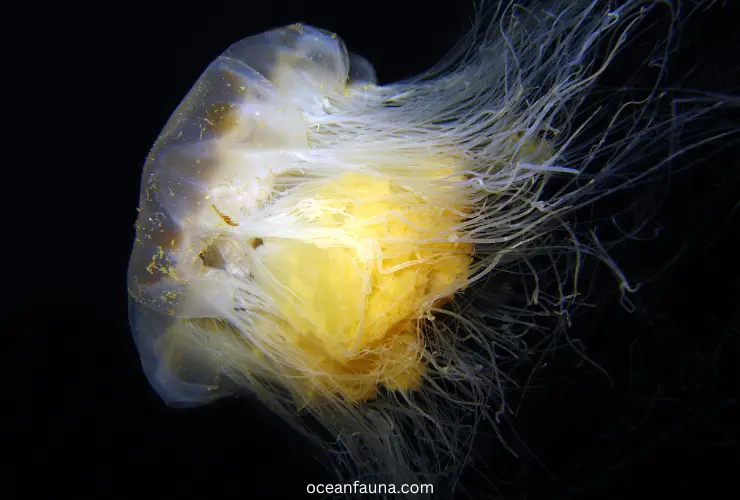
Contrary to many myths, jellyfish do eventually die. However, some studies say that there are some special species of sea jellies that have the ability to regenerate their cells. They have a potentially indefinite lifespan. That’s a different, phenomenal stage. But does it mean they are immortal? No.
There are many factors associated with these creatures that can lead to their eventual death. So, we can say that jellyfish have a finite life, just like other living organisms. Ok, now let’s discuss it in detail to understand it best.
According to the Australian Academy of Science, it is possible to reverse the slow process of aging. Only jellyfish have the ability to do so. The researchers added the following facts about it:
“There is only one species that doesn’t follow the natural way of living and dying. These living organisms have slowed down the process of aging. How? Let’s make it simple. These creatures are known as immortal jellyfish, but that doesn’t mean they are immortal in a real sense. Immortal means something else here.”
The report further states:
“In other words, these are called the jellyfish Turritopsis dohrnii. These transparent, tiny, and stingy creatures hang out day and night in the oceans all over the world. They have the ability to turn back time through the reverted and earlier stage of their life cycle.”
The authors have explained it in further detail in the following words:
“Jellyfish have a life cycle with medusa and polyp stages. The medusa stage is free-swimming and reproduces sexually. Fertilized eggs develop into larvae that settle on the seafloor and become polyps. The polyp reproduces asexually and can develop into a medusa.
When the medusa dies, it releases eggs or sperm to form new polyps. This way, individual jellyfish may die, and the species can continue indefinitely. This is the secret of immortal jellyfish to cheat death. This is the perfect solution to the question: how do jellyfish live forever?”
So, the report clearly said that these immortal jellyfish once died. It means they are not immortal; their life cycle and reproduction system are simply different. However, different ways of living don’t mean they will last forever.
BBC Earth’s news has also shown concern by talking about the jellyfish that never die. They have also explained the above-mentioned procedure. They talk about how Turritopsis dohrnii dies, starts decaying, and lives its life again. (Source)
How Long Do Jellyfish Live?
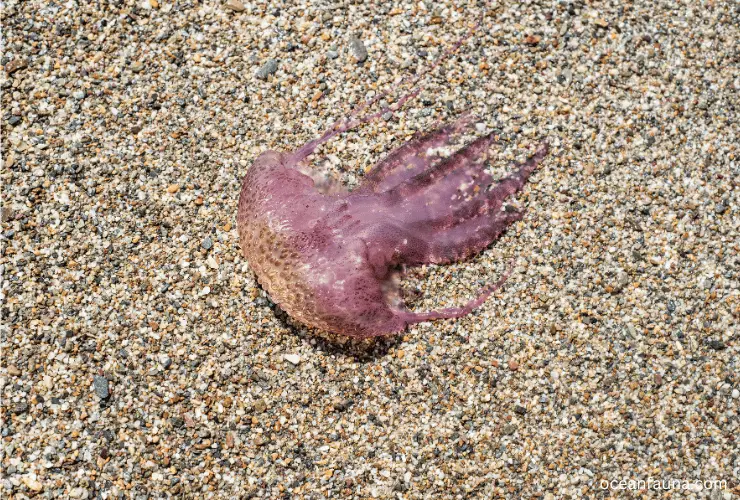
According to the Jelly Watch’s organization’s researchers, jellyfish don’t live more than a year. They enjoy their lives for less than one year. Interestingly, the smallest sea jellies live only a few days. This is a really strange fact, but it’s reality.
The jellyfish’s form is part of the natural life cycle of each species. They have different life stages, like Medusa, Polyp, and Ephyrae. Let’s see the following amazing stages of this animal’s life:
- Polyp stage: Stationary and attached form of jellyfish.
- Medusa stage: Free-swimming stage of jellyfish.
- Ephyrae stage: Small, immature medusa stage.
- Planula stage: Larval stage of jellyfish.
- Strobila stage: Transitional stage between polyp and medusa.
- Scyphistoma stage: Adult polyp stage in some jellyfish species.
Important note: The “reproductive stage” of jellyfish can occur during the medusa stage. In this stage, they release eggs or sperm into the water for sexual reproduction.
In some species, asexual reproduction can occur during the polyp stage, where new individuals bud off from the parent polyp. The cycle goes on like this.
Smithsonian Institution has also suggested the approximate lifespan of a jellyfish in the following words:
“These short-lived aquatic animals can also live for two to three years in captivity. Their polyps can live. They reproduce asexually for many years. These transparent creatures then evenly decay.”
Thus, when a jellyfish dies, it starts living again. There are numerous creatures that reproduce in an asexual manner. The best example is sea urchins.
Can Jellyfish Die Naturally?
Yes, jellyfish can die naturally. According to the study, the process of dying goes on indefinitely. This is a theoretical concept. The rendering of the sea jelly’s immortality is also impacted by this. These individuals can die in practice.
In their natural habitat, most of the jellyfish (We are talking about the immortal jellyfish or Turritopsis dohrnii here) die without going back to the polyp form. In their medusa stage, they can become a disease victim as well as a predator.
Do Jellyfish Die Out of Water?
Yeah, jellyfish die in water. It’s a marine animal, and these aquatic friends cannot live without water. They take oxygen from seawater with the help of their skins.
So, if they are put out of the water on dry land, they will eventually die. They cannot survive a long time without water. They can spend only a few minutes or hours alive in the dry. There are hundreds of instances that can be taken as examples when retreating tides pull them out of the water and they dry out of water. Their bodies have more water, and it is obvious they cannot survive without it. The Internet is full of these examples.
What Would Be the Lifespan of Immortal Jellyfish If They Don’t Die?
The lifespan of immortal jellyfish would be infinite if they didn’t die. They might have an endless lifespan. Now, this is something that is pretty impressive. Let’s see what the research of the Natural History Museum says about these mythical creatures:
“These creatures have been swimming and living in the oceans for longer than the dinosaurs existed. That means one immortal jellyfish could have been alive for over 66 million years if they hadn’t died! It’s hard to imagine, but these cute creatures would be true survivors if they didn’t die.”
Let’s take the research of the Universidad de Oviedo researchers that was done in Spain. It sequenced the genome of the immortal jellyfish and a close mortal relative. This study uncovers the fact that the creature would be able to regenerate and potentially live forever if they didn’t die in their Medusa stage. First of all, they compared their genomes and found something amazing. (Source)
Then, they found that the number of genes associated with gene repair and protection in T. dohrnii is double that of others. The mutations that prevent cell division and telomere breakdown are also different.
Additionally, during metamorphosis, some development-related genes reverted to their polyp state. These discoveries offer insight into the genetic underpinnings of the jellyfish’s remarkable longevity. However, it also gives us a clue that they don’t live forever. It’s just their unique genetic system that makes them popularly known as immortals.
What Would Be the Oldest Immortal Jellyfish If They Don’t Die?
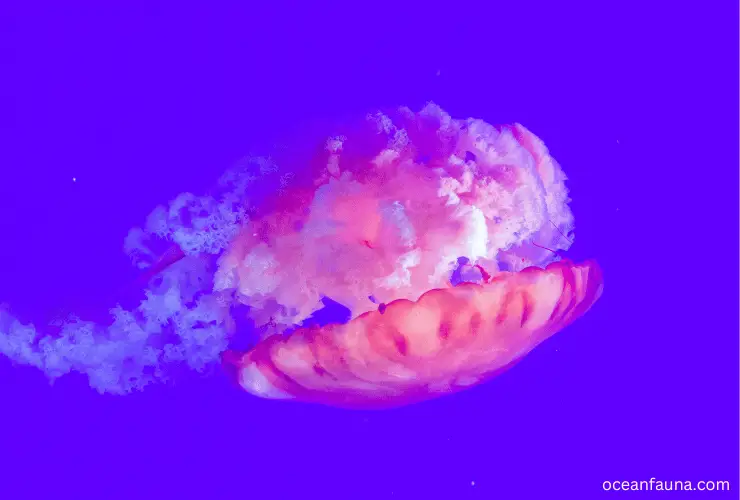
Turritopsis dohrnii is known as the oldest immortal jellyfish. This is an old-age question and a myth too. It’s a bit tricky, too. It’s because immortal jellyfish don’t really have a set lifespan. But we can certainly talk about some of the oldest known specimens.
According to a study, immortal jellyfish were discovered in the 1980s in the Mediterranean Sea. It has become a scientific celebrity due to its unique ability to reverse aging. But we have seen studies that talk about how reverse aging doesn’t mean people don’t die. They die once and then reproduce again after their death.
In other words, it essentially doesn’t live forever. So, the exact age of an individual immortal jellyfish is difficult to determine. They have the ability to revert back to their juvenile polyp state even after dying once in their Medusa stage.
However, there are known populations of Turritopsis dohrnii that have been thriving for decades. The species is thought to have originated in the Caribbean but has since spread to all oceans. It’s also possible that individual jellyfish have been alive for centuries or even millennia. However, we all know that these are just myths.
This is a result of their extraordinary capacity to potentially give life again after dying once. The concept of an immortal creature is fascinating and mysterious, but myths do not have any reality. It’s hard to fathom a being that lives indefinitely without the natural decline of aging. But for the immortal jellyfish, this is a myth, and many people believe it. However, we all know that even immortal jellyfish also die.
How Do Jellyfish Go from Genetics To Immortality?
Let’s summarize what our Quora colleagues have to say. The secret to the immortality of jellyfish lies in their unique biological processes. It follows that the idea that immortal jellyfish never die is just a myth that has persisted for many years. Unlike other animals that have a fixed lifespan, jellyfish can transform their cells after death. This process is known as transdifferentiation.
They can use it to turn their cells back in time to a more embryonic state. So, they create new cells by rejuvenating themselves. Additionally, immortal jellyfish have evolved to have an impressive arsenal of genes associated with repairing damaged DNA. It protects them against oxidative stress.
So, in this way, they can prevent age-related decline. However, the exact reasons for their immortality are still under study. These remarkable creatures provide insights into the fascinating and complex world of cellular regeneration. It could even have implications for medical research.
Immortal Jellyfish and Human Aging Discoveries
According to the news update of Smithsonian Magazine, immortal jellyfish could help to slow down the aging process of humans. It might guide us to making additional discoveries. Turritopsis dohrnii has a remarkable genetic structure, and recent research is helping to map the genetic makeup of this species of sea jelly.
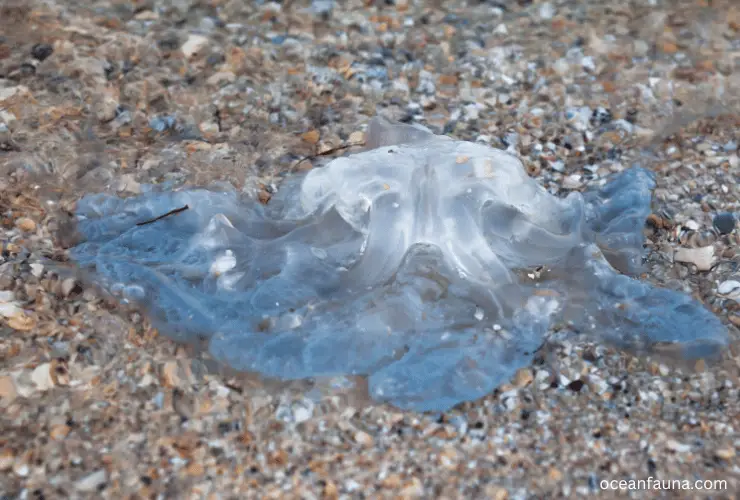
To fully comprehend the aging process of this jellyfish, more study is necessary, according to Lonee Lee Hood for Futurist. Let’s take an example, the scientists don’t know whether the new adult medusae are the same species they were once when they reverted back to the first stage – polyp stage. ~ Source
Carlos López-Otn, a biochemist and molecular biologist at the University of Oviedo, said in a statement: “It is totally false that humans will live longer than their expected age or forever. However, further research on immortal jellyfish will help in the anti-aging process. However, these studies will help us to cope up with other diseases. In this way, we can live a little longer and humans will never be overwhelmed by many diseases. ~ Source
As a result, research on immortal jellyfish will also benefit the human pharmaceutical industry. Brooks Hays at UPI Science News talks about the DNA replication study of these jellyfish. He thinks that scientists are learning more about the replication of DNA cells in immortal jellyfish thanks to the use of fluorescent biomarkers. Scientists are hoping for the best to develop treatments for various diseases that are caused by genetic disorders like cancer. ~ Source
Can You Touch a Dead Jellyfish? What Happens If You Touch a Dead Jellyfish?
You can touch a dead jellyfish out of curiosity. However, whether it is alive or dead, you should never do this. Let us see what guidance our Quora colleague Bani Biswas has to offer on this issue:
“Jellyfish catch and consume other sea creatures using their stings, just like octopuses. These stings can brush against humans (even on dead jellyfish). They can cause red marks, pain, numbness, tingling, and itching. So, while dead jellyfish can be touched, it’s important to be careful to avoid stingers. So, don’t poke them!”
Now come to the second part of this question. What if you touched a dead sea jelly accidentally or intentionally? Let’s see what the latest research has revealed about it:
“Jellyfish tentacles have tiny stingers called nematocysts. These can stick to the skin and release venom. The nematocysts can still sting, even if the jellyfish is dead.
It is because their cell structure remains intact long after death. Nematocysts release venom when they come into contact with a foreign object. It will continue to do so until the cells are removed from the skin.”
Can Dead Jellyfish Hurt You?
It’s a big yes. Dead jellyfish can hurt badly. As we have mentioned before, the tiny stingers of a dead jellyfish can release toxic venom. Don’t even think about touching or picking it up from the shores or the waterbeds. However, do not take stress if you do accidentally get stung by a dead jellyfish.
There are ways to alleviate the pain. You can rinse the affected area with vinegar, which can help neutralize the venom. Then, carefully remove any remaining tentacles or nematocysts with tweezers. Applying a cool compress can also help ease the pain. It can also reduce swelling.
What if the pain is severe? If the pain is severe or you’re experiencing an allergic reaction, seek medical attention right away. So, there you have it. Even though they may look harmless, dead jellyfish can still pack a punch. Stay safe and enjoy the beach. Don’t ever try to touch these venomous creatures.
Are Jellyfish Dead When Washed Up?
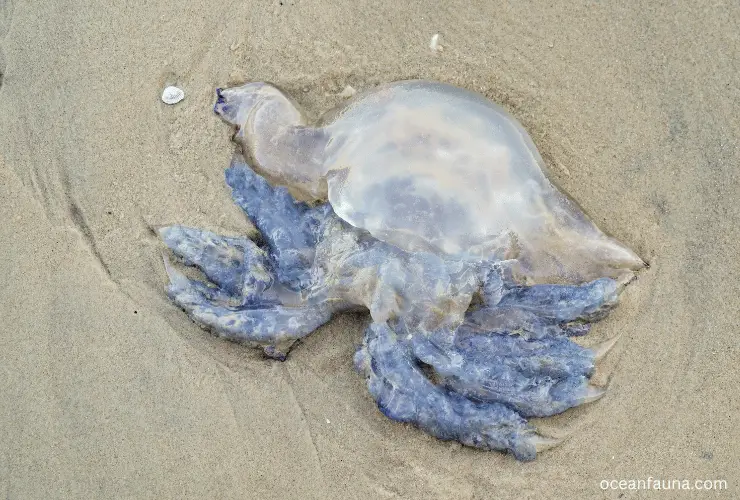
Jellyfish could be dead or alive when washed up. Let’s look at this answer in gory detail. When you spot a jellyfish washed up on shore, you might wonder if it’s still alive.
You wonder if you should touch it or if it’s ready to join Davy Jones’ locker. The truth is, it can be tricky to tell if a jellyfish is dead or alive just by looking at it. So, don’t be too quick to touch it, though, because even a dead jellyfish can still sting you.
It’s best to give any jellyfish you spot on the beach a wide berth. In this way, you will be on the safe side. If you’re curious about jellyfish and want to learn more about these cool creatures, there are plenty of resources out there to help you.
You can explore the wonderful world of the ocean without touching these dangerous creatures. You could be in trouble. So be careful, mate!
Another study has mentioned something crazy about these creatures. They said that thousands of Moon Jellyfish are washed up on the west coast of England and Wales each year.
Sadly, once they are washed up by the tide, they begin to die. It is because they are aquatic animals and depend on the oxygen in seawater to survive. As soon as they are on dry land, they cannot breathe and cannot live any longer. Keep in mind that jellyfish are marine organisms and that they require water to survive.
FAQs
Are immortal jellyfish endangered?
Immortal jellyfish are not listed as endangered. They are found in oceans around the world, but their populations may be impacted. It can be due to changes in their environment, like pollution or overfishing. However, they are not currently listed as an endangered species.
Are jellyfish still poisonous when dead?
Yes. Jellyfish can be poisonous when dead. Cleveland Clinic has also mentioned it in its precautions. Avoid consuming these poisonous and dangerous sea jellies. The dead jelly has the potential to make you feel sick and in severe pain.
How fast do jellyfish die out of water?
Jellyfish can only survive in water. So, when they are out of the water, they can die very quickly. The exact time it takes for a jellyfish to die out of water depends on several factors. These factors could be the species of jellyfish, the temperature and the humidity levels.
In general, smaller jellyfish tend to dry out faster. They can die within minutes (up to 45 minutes) of being out of water. Larger jellyfish can survive for slightly longer periods of time. They will still eventually dry out and die if they are not returned to the water.
Conclusion
Jellyfish can live and die just like all other living organisms in this world. There is no truth to the myths about immortal jellyfish defying the laws of physics. No doubt, they are the most interesting aquatic animals that we have ever seen in the world of seas and oceans. They stand out from other marine animals because of their distinctive means of survival. Also, their ability to live through regeneration is remarkable!

